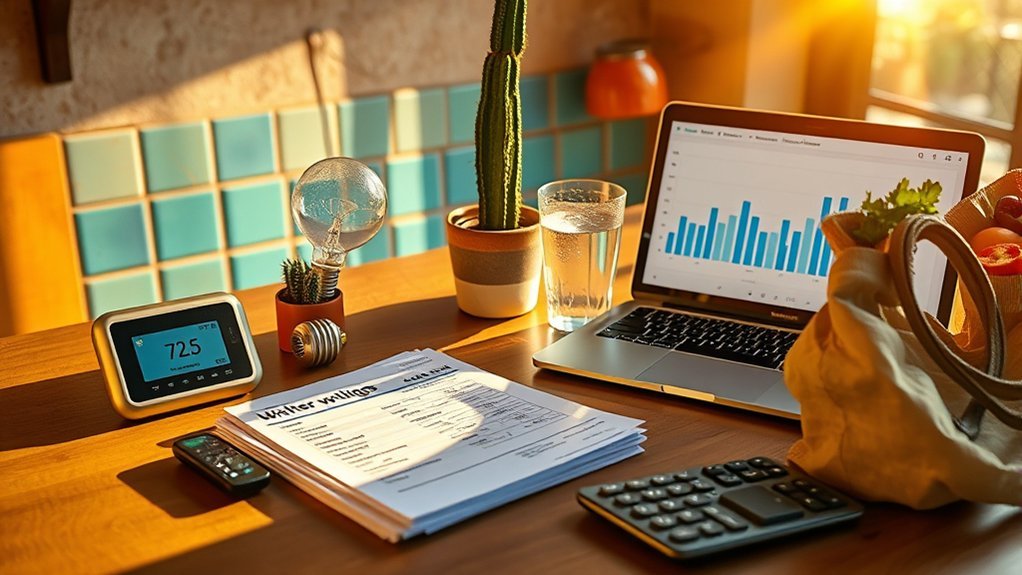Like discovering a familiar map in a new city, you’ll find Albuquerque’s costs close to, but not the same as, the U.S. average. You can expect typical household spending near $4,400/month and renters about $2,880, with housing as the biggest variable. I’ll break down rent ranges, utilities, groceries, transport, and neighborhood differences so you can see what to budget next.
The Big Picture: Albuquerque’s Overall Cost of Living

Although Albuquerque won’t break the bank, you’ll still see variation across categories: overall living costs run about 6% below the U.S. average, with a typical household spending roughly $4,423 per month.
You’ll find an affordable cost of living driven largely by housing in Albuquerque and modest grocery costs—groceries sit about 2.3% under the national norm.
Expect housing to be a major line item: average monthly rent for a one-bedroom is about $1,162, roughly 29.1% lower than the national average, which helps keep monthly expenses manageable.
Expect housing to dominate expenses — one-bedroom rent averages $1,162, about 29% below the national norm.
Don’t overlook utilities, though; typical apartment utility bills trend higher than average, near $363.54 monthly, and that nudges up your overall cost of living.
If you’re comparing cities, focus on the combined effects: lower rent and grocery costs offset elevated utilities, producing a generally affordable cost of living.
Use these figures to project budgets and prioritize spending when planning a move.
Monthly Budget Breakdown for Renters

Now that you’ve seen the big-picture numbers, let’s break down what a typical month looks like for a renter in Albuquerque. Your estimated monthly budget is about $2,880, which captures rent, utilities, and other living expenses.
Use the figures below to allocate spending realistically and spot where you can trim costs.
- Rent: average rent for a luxury studio/one-bedroom is about $1,350 — the biggest single line in your budget.
- Utilities: plan roughly $200 monthly for electricity, water, gas, and trash; it’s slightly above national average and affects discretionary cash.
- Grocery expenses: expect $300–$400 per month for a single adult, aligning with an average annual food cost near $4,079.
- Transportation costs: budget around $300 monthly for fuel and vehicle upkeep; this varies with commute distance.
These data-driven targets will help you balance necessities and savings within your monthly budget while tracking essential cost centers.
Housing Costs: Rent, Mortgages, and Neighborhood Differences

You’ll want to compare current rent figures — median rent $1,205, one-bed $991, two-bed $1,268, and average single-renter $1,162 — to local mortgage costs when deciding whether to rent or buy.
With a median home price of $308,100 (well below many major cities) you can run scenarios showing how long it takes monthly mortgage payments to beat rent.
Also factor neighborhood differences: Nob Hill and High Desert run pricier, while South Valley and West Mesa are significantly more affordable.
Rent Price Breakdown
If you’re comparing housing options in Albuquerque, rent and mortgage costs are markedly lower than the national average: median rent for a one-bedroom is about $991 and a two-bedroom runs $1,268, while the overall average monthly rent sits at $1,391 (roughly 29.1% below the U.S. average).
This rent price breakdown helps you plan realistic budgets and highlights Albuquerque’s lower cost of living and housing costs. The median home price sits near $308,100, reinforcing affordability for some buyers.
Neighborhood choice shifts costs considerably; prioritize location to match needs and budget.
Quick takeaways for monthly rent in Albuquerque:
- Expect one-bedroom vs two-bedroom splits: $991 vs $1,268.
- Overall average monthly rent: $1,391.
- Affordable areas: South Valley, West Mesa.
- Pricier pockets: Nob Hill, High Desert.
Buying vs. Renting
Because monthly rent in Albuquerque averages about $1,391 while the median home price sits near $424,687 and mortgage rates are around 7.00%, you’ll often find renting cheaper up front but buying can pay off long term depending on neighborhood and financing. You should weigh buying vs. renting by comparing average monthly rent to estimated mortgage payments, taxes, and maintenance. Homeowners here see average monthly housing costs of $7,898, below national averages; that favors purchase if you stay long term. Use affordable options like South Valley or West Mesa for lower entry costs; expect higher prices in Nob Hill and High Desert. Consider current mortgage rate impact on monthly cash flow and long-term equity accumulation.
| Factor | Typical value |
|---|---|
| average monthly rent | $1,391 |
| median home price | $424,687 |
Neighborhood Cost Differences
Having compared renting and buying, look next at how costs change by neighborhood since where you live will strongly affect monthly housing expenses.
You’ll see neighborhoods drive differences in rent, mortgages, and overall living costs — the city median one-bedroom rent is $991, two-bedroom $1,268, while average monthly rent is $1,391.
Median home cost is about $308,100, and homeowners’ expenses average $7,898 monthly.
- Nob Hill and High Desert: higher living costs, pricier rent and mortgages.
- South Valley and West Mesa: more affordable housing, lower rent and home prices.
- Citywide: rental market ~12.2% below national average; plan for $3,303 monthly income to afford a one-bedroom.
- Budget tip: prioritize neighborhood trade-offs between price and amenities.
Utilities and Monthly Household Bills

While Albuquerque’s rent might look reasonable, you’ll likely pay more than the national average once utilities are added: a 915‑sq. ft. apartment runs about $363.54/month for utilities versus the U.S. average of $253.14. Your utility costs break down roughly to electricity costs around $200.70, natural gas about $82.63, water near $36.51, and other fuel/fees about $43.70. Average monthly utility bill figures vary by season; combined energy (electric + gas) often falls between $165.83 and $200.70 depending on heating or cooling needs. Additionally, regular inspections of your air conditioning system can help prevent costly repairs related to issues such as a damaged blowing hose.
Plan $300–$400/month for basic utilities in a small apartment, and confirm which utilities in Albuquerque are included in rent. Phone and internet commonly add another $192.92 for cellular plus $30–$80 for home internet/streaming, though some rentals bundle internet or utilities and lower out‑of‑pocket bills. Check water and trash inclusion and budget for seasonal spikes.
Food, Groceries, and Dining Out Expenses

Utilities eat into your monthly budget, so it helps to know what food will cost before you sign a lease. In Albuquerque the average food cost for one adult is about $4,079/year (roughly $340/month for groceries and food-at-home), while a family of four averages about $11,988/year (~$1,000/month). Grocery prices are near the national norm (grocery index 96.0); expect items like milk $4.61/gal, a dozen eggs $3.01, and ground beef $7.11/lb.
- Plan weekly groceries between $100–$250 to match typical spending and control your monthly food budget.
- If you eat out, total food and dining for a single can reach ~$676/month when combining groceries and dining.
- To lower costs, shop local markets and use seasonal produce to shave bills below city averages.
- Compare prices across chains and buy staples in bulk to keep groceries predictable and close to the average food cost for Albuquerque. Additionally, consider budgeting for preventative measures such as regular meal planning to help minimize food waste and maximize savings.
Transportation and Commuting Costs

Expect to spend about $777 a month on transportation as a single adult in Albuquerque, with fuel — roughly $3.10 per gallon — driving most of that cost if you commute by car.
You can lower expenses by using ABQ RIDE buses or the Rail Runner, though those options can add time and scheduling limits compared with driving.
If you choose a walkable neighborhood and bike or use transit more, you can cut well below the city averages and reduce maintenance and fuel line items. Additionally, understanding local market conditions can help you make informed decisions about your overall living costs.
Public Transit Options
Looking for ways to cut commuting costs in Albuquerque? You can trim transportation costs markedly by choosing public transit over driving.
ABQ RIDE fares run about $1.25–$2.00 per ride (discounts available), and the New Mexico Rail Runner Express links Albuquerque with Santa Fe and Rio Rancho with weekday/weekend service and monthly passes to lower long-commute expenses.
Consider these practical options:
- Use ABQ RIDE for local trips to avoid parking and maintenance fees.
- Buy Rail Runner monthly passes if you commute to Santa Fe or Rio Rancho.
- Live in walkable areas like Nob Hill to support car‑light living and reduce reliance on cars.
- Track the local gasoline price (~$3.10/gal) and compare costs versus monthly passes.
Public transit is a data-driven way to reduce your overall annual transport spending.
Driving and Fuel Costs
If you rely on a car instead of ABQ RIDE or the Rail Runner, plan on fuel and upkeep dominating your monthly transportation outlay: average annual costs for a single adult run about $9,325, while a family of four can expect household transportation near $15,641 because of extra driving and vehicles. You’ll see transportation in Albuquerque driven by gasoline averages near 3.10 per gallon, so fuel costs add up quickly. Factor regular car maintenance — things like tire balancing at about $42.50 — into budgets. Consider public transit to cut costs. Below is a quick cost snapshot to help you plan.
| Item | Typical cost |
|---|---|
| Single annual transportation cost | $9,325 |
| Family (4) transportation | $15,641 |
| Gasoline (per gallon) | $3.10 |
| Tire balancing (visit) | $42.50 |
Healthcare, Child Care, and Family Expenses

Although healthcare in Albuquerque runs below the national average, you’ll still need to budget carefully for both medical and childcare costs: annual healthcare averages about $2,723 for a single adult and $7,660 for a family of four (with a typical doctor visit near $133), while childcare for two kids with two working parents can climb to roughly $19,255 a year and often exceeds the median one‑bedroom rent of $991 per month depending on care type and subsidies.
You should factor lower healthcare costs into your monthly budget but not let that obscure childcare expenses, which often dominate family spending. Practical steps include comparing providers, checking subsidies, and planning emergency funds. Understanding how average healthcare costs can affect your overall budget is crucial.
- Prioritize preventive care to reduce unexpected healthcare costs and lower average doctor visit frequency.
- Compare daycare vs. in‑home care to estimate realistic childcare expenses per child.
- Include childcare in your monthly budget before housing choices.
- Track subsidies and tax credits to improve affordable cost of living for your family.
Job Market, Salaries, and How Much You Need to Live Comfortably

Because Albuquerque’s job market blends stable public and research employers with growing private sectors, you can usually find roles across healthcare, education, tech, and tourism that match varied skill levels and salary needs. With unemployment near 4.1% and anchors like the University of New Mexico and Sandia National Laboratories, hiring is steady; growth sectors offer pathways to higher salaries.
Albuquerque’s stable public and research employers plus growing private sectors offer steady hiring across healthcare, education, tech, and tourism.
Median Household Income sits around $65,604, below the U.S. median, so your purchasing power depends on pay versus local Cost of Living.
A single adult typically needs $40,000–$60,000 annually to live comfortably; data-driven targets put a single-earner comfortable-living figure near $56,832 before taxes.
Housing is a large line item: Apartment in Albuquerque and home prices mean housing can represent roughly $25,800 per year.
Translate annual targets into monthly budgets, prioritize higher-paying roles in growth sectors, and compare posted salaries to these benchmarks to assess whether a job will support comfortable living.
Frequently Asked Questions
What Is the Average Cost of Living in Albuquerque NM?
You’ll pay about $2,880 monthly as a single renter, with lower grocery prices, modest utility bills, affordable childcare costs, decent healthcare access, usable public transportation, many outdoor activities and varied entertainment options keeping overall costs below national average.
How Much Money Do You Need to Live Comfortably in Albuquerque?
You’ll need about $4,700–$5,700 monthly to live comfortably in Albuquerque. Picture balancing job market earnings against transportation costs, healthcare access, utility expenses, food prices, childcare options, and leisure activities for realistic budgeting.
Is Rent Expensive in Albuquerque?
Rent’s generally affordable compared to major metros; you’ll see housing trends showing lower medians, but costs vary by neighborhood safety, rental incentives, utility variability, pet policies, short term rentals and evolving tenant rights you should review.
What Is the Average Cost of Living in NM?
New Mexico’s average cost of living is modestly lower than national levels; you’ll track housing trends, utility expenses, food prices, transportation costs, healthcare access, education expenses, and tax burden to plan around slightly reduced overall expenses.
Conclusion
Living in Albuquerque is doable if you plan carefully: your typical household budget is about $4,423/month and renters often spend roughly $2,880/month. Housing is the biggest variable—expect one‑bed rents near $1,162–$1,350, with cheaper options in South Valley or West Mesa. Utilities, groceries, and transport add $800–$1,060 more. Like a calibrated scale, weigh neighborhoods, salary, and family needs to set a realistic, data‑driven monthly target.


